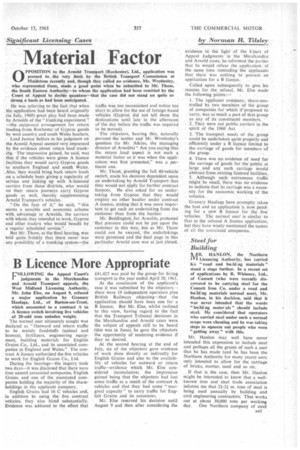Material Factor
Page 79

If you've noticed an error in this article please click here to report it so we can fix it.
'by NormanH. Tilsley 0 PPOSITION to the Arnold Transport (Rochester), Ltd., application was pressed to the very limit by the British Transport Commission at Maidstone recently and, though they called no evidence, Mr. Wrottesley, who represented them, made a good point when he submitted to Mr. Thom, the South Eastern Authority—to whom the application had been remitted by the Court of Appeal to decide quantum—that the case did not stand on quite so strong a basis as had been anticipated.
He was referring to the fact that when . the application had been heard originally (in July, 1960).great play had been made by Arnolds of the " trupking experiment" —the reciprocal arrangement for return loading from Rochester of Gyproc goods -by west country and south Wales hauliers.
• Lord Justice Sellars in his judgment on the Arnold Appeal seemed very impressed by the evidence about return load trunkihg. The-impression gained, he said, was that if the vehicles were given A licence facilities they would carry Gyproc goods to southern. England and south Wales. Also, they would bring back return loads on a schedule basis giving a regularity .of service and linking up with A-licensed carriers from those districts, who would on their return journeys carry Gyproc goods as well, thereby supplementing Arnold Transport's vehicles.
"On the face of it," he said, " this seems a sensible and economic scheme with advantage to Arnolds, the carriers with whom they intended to work, Gyproc and other traders who would benefit by a regular scheduled service."
But Mr. Thom, at the final hearing, was told quite frankly that there never was any possibility of a trunking system—the traffic was too inconsistent and notice too short to allow for the use of foreign-based vehicles (Gyproc did not tell them the destinations until late • in the afternoon of the day before the traffic was required to be moved).
The objectors, hearing this, naturally pursued the Matter and Mr. Wrottesley's question (to Mr. Atkins, the managing director of Arnolds) "Are you saying that the return load aspect is not such a material factor as it was when the application -was first presented," was a pertinent one.
Mr. ThoM,. granting the full 40-vehicle switch, made his decision dependent upon an undertaking by Arneld Transport that. they would not apply for further contract licences. He also asked for an undertaking from Gyproc that they would employ no other haulier under contract A licence, stating that it was more important to get such an undertaking from the customer than from the haulier.
Mr. Beddington, for Arnolds, protested that pressure could not be put upon the customer in this way, but as Mr. Thom could not be swayed, the undertakings were promised and the final page in this particular Arnold case was at last closed. evidence in the light of the Court of Appeal Judgments in the Merchandise and Arnold cases, he informed the parties that he would refuse the application, at the same time -reminding 'the applicants that there was nothing to prevent an application for a B licence.
Called upon subsequently to give his reasons for the refusal, Mr. Else made the following points:—'
• 1. The applicant company, share-controlled by two members of the group of companies for which it-proposed to ' carry, was aS much a part of that group as any of its constituent members.
2. They were not public carriers in the spirit of the 1960 Act. • 3. -The transport need's of the group could be undertaken quite properly and efficiently under a B licence limited to the carriage of goods far members of the group.
4. There was no-evidence of need for the carriage of goods for the' pUblic at large and any such carriage would abstract from existing licensed facilities.
5. Although such extraneous traffic might be small, there was no evidence to indicate that its carriage was a necessity for the economic working of the vehicles.
Granary Haulage have promptly taken the hint and an application is now pending for a new B licence for the five vehicles. The normal user' issimilar to that in the refused A licence application, but they have wisely mentioned the names of all the associated companies.




































































































































